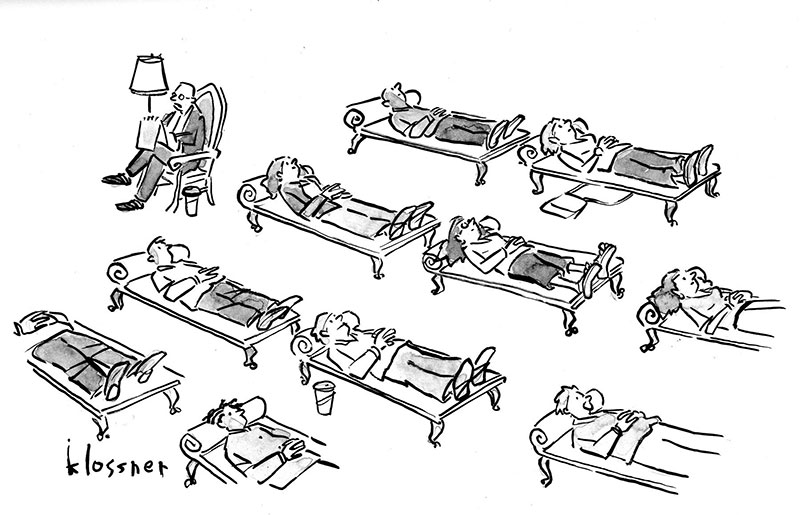 In John Klossner’s cartoon, every patient in a group therapy session is lying on their own couch and staring at the ceiling with their hands on their abdomens. The therapist is speaking.
In John Klossner’s cartoon, every patient in a group therapy session is lying on their own couch and staring at the ceiling with their hands on their abdomens. The therapist is speaking.
Because there are so many patients I immediately thought of multiple personality disorders. Instead of making a joke about one patient with dissociative identity disorder, however, I assumed that each patient had his or her own discrete condition:
- “You have multiple personality disorders.”
- “Sorry, I should have been more specific. Each one of you has a personality disorder.”
I then focused on the couches, which are typically used in private sessions by therapists who subscribe to Freud’s method of psychoanalysis:
- “I should have bought ten chairs.”
- “I’m new to group therapy.”
- “I assume this is how Freud would have handled group therapy.”
Now let’s see how you did:
Let’s start with this entry, which puts a spin on the question that many therapists ask at the beginning of a session: “Tell me about yourselves.”
And here’s a particularly fitting follow-up question: “Number six, tell me more about feeling faceless and insignificant.”
There were a lot of variations on the question that Freudian therapists always ask:
- “And how does that make everyone feel?”
- “And how does that make you all feel?”
- “How do you all feel about that?”
The next entry acknowledges that group therapy sessions are cheaper than the private alternative: “I sense a hostility to your new HMO.”
These two entries continue the insurance theme, and imply that the therapist might be more interested in those patients whose plans require them to pay more:
- “Let’s start with the highest deductible.”
- “The ten dollar co-pays today will just listen.”
That second caption would be punchier without the word “today.”
Two of you noted that group sessions could be even more remunerative for the therapist than one-on-one sessions:
- “It’s your mother’s fault. Okay, bring in the next group.”
- “Let’s see, $250 times…”
If money were no object, most patients would choose private over group therapy sessions, as these two entries acknowledge:
- “Now I’d like you all to close your eyes and visualize being in a private session.”
- “Individual therapy is available for the narcissists among us.”
There were a lot of Groupon jokes, but these were the best:
- “Welcome to Groupon addiction therapy.”
- “I regret offering the Groupon.”
As expected, there were a number of references to multiple personality disorders, and I especially liked these two:
- “So tell me about your multiple personalities.”
- “I have multiple patient disorder.”
This next set of entries identify the drawbacks of the group therapy session Klossner has envisioned:
- “So that’s where we left off last week…and now it seems we are out of time for today.”
- “Your problems will be addressed in the order in which they were received.”
- “Perhaps speaking one at a time would be helpful.”
- “Sorry, whose mother was distant?”
I really like all four of those captions, but the first would be better without the last two words. The punchline is “out of time,” not “for today,” and the words “for today” do not add anything to the joke. They just detract from its power.
I love this explanation for why one psychoanalyst is addressing ten patients: “The other nine therapists are running late.”
I like this entry—“When did you first have this fear of being alone?”—but replacing “have” with “experience” (while violating the rule that shorter is always funnier) might make it even better.
Several of you had the therapist suggesting or dismissing possible diagnoses:
- “My initial diagnosis is codependency.”
- “For starters, I’m ruling out social anxiety.”
As I’ve written many times before, I especially like captions that highlight the obtuseness of the person who’s speaking:
- “Welcome to our first session on how to assert your individuality.”
- “Repeat after me. I am unique and special.”
Therapists sometimes try to reassure patients that their problems are not unique, and these next two entries give such assurances a different yet fitting meaning within the context of Klossner’s cartoon:
- “Don’t worry, that’s very common.”
- “You’re not alone.”
These captions explain why the therapy session is so large:
- “Misery loves company.”
- “Thank you for tearing a slip off my flier.”
I really like the idea of a therapist publicizing his services the way someone might advertise free guitar lessons.
Many people seek therapy because of problems with their family, as these two entries acknowledge:
- “Does anyone have anything nice to say about their parents?”
- “Family gatherings can be very stressful.”
Many of you alluded to the problem of maintaining client confidentiality in a group therapy session, but no one did it better than the person who submitted this entry: “Let’s begin with confidentiality waivers.”
Here’s the week’s best dirty joke: “The first rule of sex addiction therapy is to stay on your own couch.”
And while I love this caption— “Let’s explore your collective unconscious”—it is only this week’s second-best entry.
The best one made me laugh out loud, and it is, ““Sorry, whose mother was distant?”

